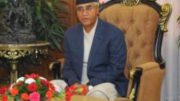A visit by Indian journalists, sponsored by the Chinese government, today turned into a propaganda exercise by the Chinese Army for delivering its message on the prolonged standoff between troops of the two countries in Doklam near Sikkim.
“You can report about what the Chinese soldiers are thinking about. I am a soldier, I will try my best to protect territorial integrity. We have the resolve and determination,” he told Indian journalists taken to visit this garrison on the outskirts of Beijing.
The visit included a rare demonstration of combat skills of the PLA troops before the Indian media.
“In addition, there are still a large number of Indian armed forces congregating on the boundary and on the Indian side of the boundary,” the Chinese Foreign Ministry had said earlier.
Responding to questions on the present impasse in Doklam, he said, “What the PLA will do depends on the actions of the Indian side ..
“We will follow the orders of the CPC (ruling Communist Party of China) and the Central Military Commission (the overall high command of the 2.3 million strong army headed by Chinese President Xi Jinping).”
About 11,000 troops are stationed at the garrison.
The state media also continued the tirade against India.
“For China, the trespassing by Indian troops was unexpected and it is unacceptable as it happened in a section of the boundary that has hitherto been considered beyond dispute by both sides in the otherwise long drawn out and arduous boundary negotiations,” it said.
“While misunderstandings between neighbours are understandable, India should engage in candid dialogue, not lawless provocations.”
India and China have been locked in a standoff in Doklam since June 16 after Chinese troops began constructing a road near the Bhutan trijunction.
India says the Chinese action to construct the road was unilateral and changes the status quo. It fears the road would allow China to cut off India’s access to its northeastern states.





Be the first to comment on "Step back from Doklam to avoid confrontation: Chinese army to India"